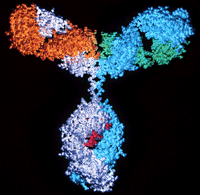Eight therapeutic monoclonal antibodies (mAbs) will lose EU and US patent protection before 2020, making way for a new class of biosimilar. The promise of biosimilar mAbs is enticing, but these are more complex molecules than current biosimilars and it is unclear how their similarity with originator mAbs will be tested.
The overwhelming concern is the risk of immunogenicity. Undetectable differences between biosimilars and originators could lead to unexpected immunogenicity. Since mAb biosimilars have not yet entered the EU or US markets, there is sparse data on their immunogenicity.
Focussing on immunogenicity, Dr Vera Brinks of Utrecht University, The Netherlands, has looked at similarity assessment between originator mAbs and biosimilars in terms of product quality attributes, non-clinical and clinical studies [1].
Immunogenicity analysis
When assessing product quality, several attributes are known to be related to immunogenicity: the primary sequence, aggregation of mAb proteins, host-cell impurities, post-translational modifications such as glycosylation and finally the presence of metal or glass particles in the final product. Non-clinical studies yield limited data on immunogenicity, but clinical studies reveal multiple patient and treatment-related factors.
Guidelines from the European Medicines Agency (EMA) call for anti-drug antibody assays to be the same for both originator and biosimilar mAbs. The guidelines also state that ‘some mAbs inhibit antibody formation when administered at high doses, and therefore studies conducted with low doses are more sensitive to compare the immune response of the biosimilar and reference medicinal products’ [2]. If the mAb contains non-human carbohydrate, the guidelines recommend that immunoglobulin E (IgE) testing be considered before clinical administration.
Although similarity between originator and biosimilar is the ultimate goal, a biosimilar with less immunogenicity would be considered for market approval. If immunogenicity is likely to be rare, additional post-marketing analysis is called for.
Almost no clinical data on immunogenicity
Brinks studied mAb biosimilars that have ongoing market approval, ongoing clinical trials or publically accessible clinical data. These include infliximab (for the treatment of autoimmune diseases), etanercept (for the treatment of inflammatory diseases), trastuzumab (for treating breast cancer) and rituximab (for non-Hodgkins lymphoma). No immunogenicity data has been released in all but one of these products.
Despite this worrying scarcity of data, early reports do suggest that infliximab and infliximab biosimilars share similar immunogenicity. An infliximab biosimilar (Remsima) was approved by the Korean FDA in 2012 [3] and two infliximab biosimilars (Remsima and Inflectra) received approval from the European Commission on 10 September 2013 [4].
Clearly, additional clinical studies and post-marketing surveillance of future mAb biosimilars will be of paramount importance before the true immunogenicity risk of future mAb biosimilars can be assessed.
Editor’s comment
If you are interested in contributing a research paper in clinical data on immunogenicity or safety issues of biosimilar mAbs to GaBI Journal, please send us your submission here.
Dr Vera Brinks, Member of International Editorial Advisory Board of GaBI Journal, published the full manuscript in GaBI Journal, 2013, Issue 4:
Immunogenicity of biosimilar monoclonal antibodies
Related articles
The future of biosimilar mAbs in Europe
Celltrion applies for biosimilar infliximab approval in Japan
Assessment of efficacy and safety of biosimilars in rheumatology
References
1. Brinks V. Immunogenicity of biosimilar monoclonal antibodies. Generics and Biosimilars Initiative Journal (GaBI Journal) 2013;2(4): 188-93. doi: 10.5639/gabij.2013.0204.052
2. European Medicines Agency. Guideline on similar biological medicinal products containing monoclonal antibodies – non-clinical and clinical issues [homepage on the Internet]. 2012 [cited 2013 Oct 4]. Available from: www.ema.europa.eu/docs/en_GB/document_library/Scientific_guideline/2012/06/WC500128686.pdf
3. GaBI Online - Generics and Biosimilars Initiative. Biosimilar monoclonal antibody approved in Korea [www.gabionline.net]. Mol, Belgium: Pro Pharma Communications International; [cited 2013 Oct 4]. Available from: www.gabionline.net/Biosimilars/News/Biosimilar-monoclonal-antibody-approved-in-Korea
4. GaBI Online - Generics and Biosimilars Initiative. EC approves first monoclonal antibody biosimilar [www.gabionline.net]. Mol, Belgium: Pro Pharma Communications International; [cited 2013 Oct 4]. Available from: www.gabionline.net/Biosimilars/News/EC-approves-first-monoclonal-antibody-biosimilar
Permission granted to reproduce for personal and non-commercial use only. All other reproduction, copy or reprinting of all or part of any ‘Content’ found on this website is strictly prohibited without the prior consent of the publisher. Contact the publisher to obtain permission before redistributing.
Copyright – Unless otherwise stated all contents of this website are © 2013 Pro Pharma Communications International. All Rights Reserved.








 0
0











Post your comment